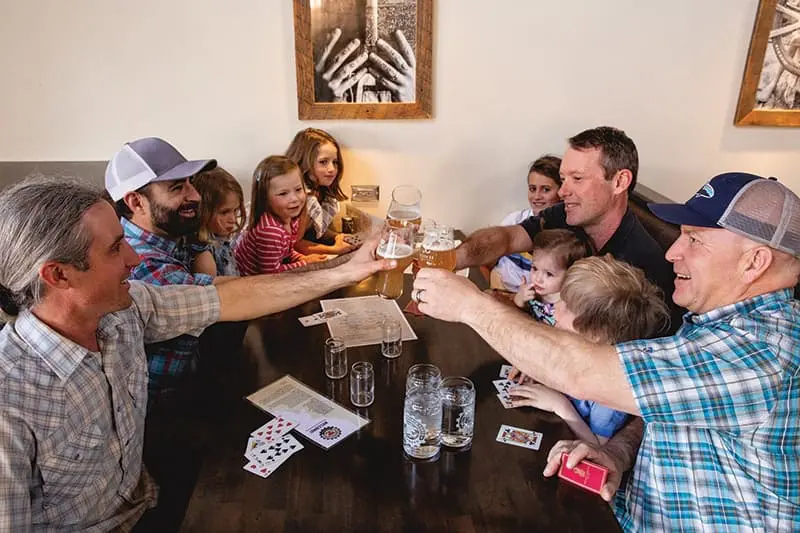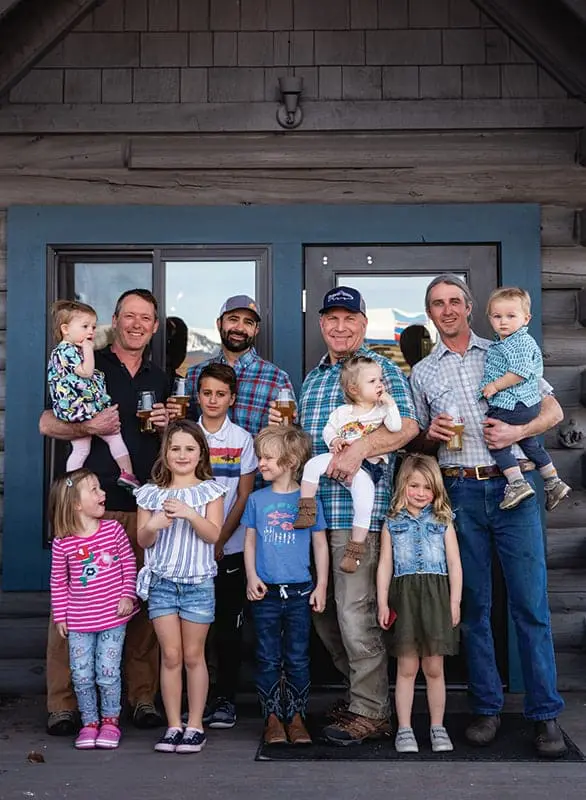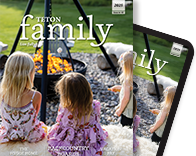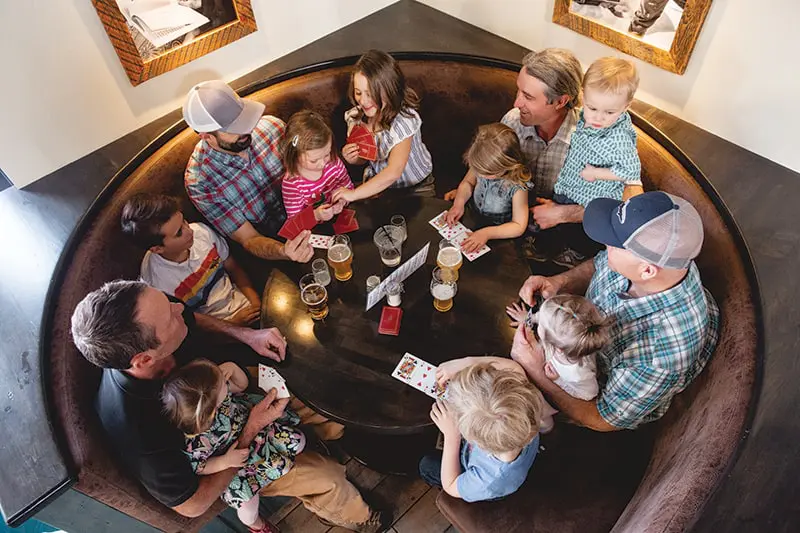By Melissa Snider // Photography by Shannon Corsi
—
This article is my husband’s fault. He suggested I pitch a piece about fathers and friendship, and now here I am, stuck in the writer’s seat. Guys, this one’s for you!
But first I should say that I actually made friends after I had babies. Between naps, I swaddled up my first daughter and hit the circuit: Mommy and Me yoga (still a lot of crying and blowouts, just not at my house), music classes (mouthing the shaker eggs), swimming (insert air quotes) … you get the picture. Moms check each other out and exchange numbers when it’s a match. And as it turns out, play dates are more for us than the kids in those early days.
Meanwhile, my husband continued life as usual but with a tiny new human in tow. (Not to mention an overly emotional and intellectually understimulated wife.) He had a strong sense of duty and wasn’t seeing much of his friends. Mostly, it was I who was tagging him “it” as soon as he walked in the door after work so I could go exercise or sleep. I was, and am, so grateful for his partnership as we parent our girls, now ages five and eight.
Instead of momsplaining all this to you, however, let’s talk to the experts. I sat down with an unscientific sampling of fathers who collectively parent eight children between the ages of four and eleven and discussed #dadlife and how it impacts friendships over time.

Here’s what they had to say:
On the “Limbo” Phase (ages 0 to 5)
Spoiler alert: Having a baby rocks your world!
“The first three years, you don’t have much energy, time, or attention to devote to anything else,” says Jackson dad Carl Shuptrine, who found himself ahead of the having-kids curve. He left his friends wondering why he couldn’t join them whenever for whatever any more. “‘I’ve got some other responsibilities,’ I’d say. And they were like, ‘Huh? You mean, other than yourself?’”
Jackson father Andy Cavallaro says the birth of his first baby left him in limbo, trying to find a balance between “still feeling like an adventurous person and being a good parent.” While his long-distance close friendships didn’t change, local friendships did. “When most of the minutes of your day are planned out, it’s really important to have that time to connect with [other dads] that can understand what you’re going through,” he says, adding that this pertains to just about any time or situation in your life.
“It changes your ability to be as present with people as you once were,” says my husband, Jason Snider, noting that our core group of friends is made up mostly of couples without children. “We value those friendships. They’re people we want to keep up with, but we don’t see them nearly as much.”
“Before kids, our friends were all about having fun,” says Sean Stauth. He and his wife naturally started spending time with different groups of people after having their first baby. At the time, he was living in San Francisco and working in Silicon Valley, where many people he knew valued work above everything else. Still, his priorities shifted after the birth of his daughters. “It was hard to build meaningful, empathetic relationships with people who weren’t in my same [stage of life].”

On Maintaining Friendships
Sean says he and his wife love hanging out with friends who share their values of living a healthy, positive life. “Friends become ‘family friends,’” he says, pointing out that a lot of their social life is a shared experience now.
“Similar likes and dislikes used to drive my relationships,” says Andy, “whereas now, my children’s connections drive a lot of the friendships we have.” He intentionally has to make time to see the people he used to ski with 50 to 70 days a year, and notes that carving time out of your daily routine to do so can seem impossible, but it’s important.
The executive director of the Community Safety Network, Andy also facilitates “The Manel,” a men’s group that confronts traditional masculine roles and offers men a safe space to have important conversations. “I’ve made a point to have relationships that weren’t just based on doing [an activity] together. My relationships [now] are more important than just having a climbing partner.”
Unlike women, most men don’t call or text their dad, brother, or any number of close guy friends when they need to vent or process something. Jason says men just don’t work that way. “I don’t know if there are many dads who want to talk and be open like that—to share things that are challenges,” he says.
“My experience is that guys will share, but only if they’re together, doing something,” says Carl, “if you’re going camping or hiking. … But I’m not just going to call Sean because I had a tough day.”
While a men’s hangout might not be the heart-to-heart experience female partners enjoy, reaching out and seeing friends has real benefits. “Every now and then, you just need a little mental departure,” he adds.

On Embracing Fatherhood
Goodbye, uninterrupted conversations. See ya later, hot meals and deep sleep. Parenting isn’t for the faint of heart. But don’t despair—the flip side of the coin is pretty amazing.
“Parenting is a totally different set of skills and challenges,” says Jason. “As much as you don’t want to say that it’s hard … it is hard. It’s different.”
“I always tell dads that it’s the hardest, most rewarding work you’ll ever do,” says Carl.
“I’ve really embraced just being a dad,” says Andy. “And I don’t mean I’m ‘just’ a dad. I mean that it’s the best thing ever to be a dad.”
Having kids is very much a “before” and “after” experience, and like any relationship, it’s never static. “At this point, Kelly and I are feeling much more freedom,” says Carl, whose daughters will enter fourth and sixth grade this fall. Sean acknowledges the newfound independence that comes as kids get older as a time to rediscover who he is.
So whether you’re contemplating becoming a father, anticipating the birth of a child, or in the weeds with a newborn, take heart: A new baby can be wildly disorienting, but just like most things in life, it’s a learning process.
“Be open to other dads who are trying to figure it out, too,” says Andy. “You gain so much when you have children, but you lose part of yourself.” Then he offers a slight correction. “You don’t lose it—but you have to redefine it. It takes a while.”
So reach out, reflect, and embrace the crumb-filled roller coaster you’ve strapped yourself into. Life is just better with friends.

